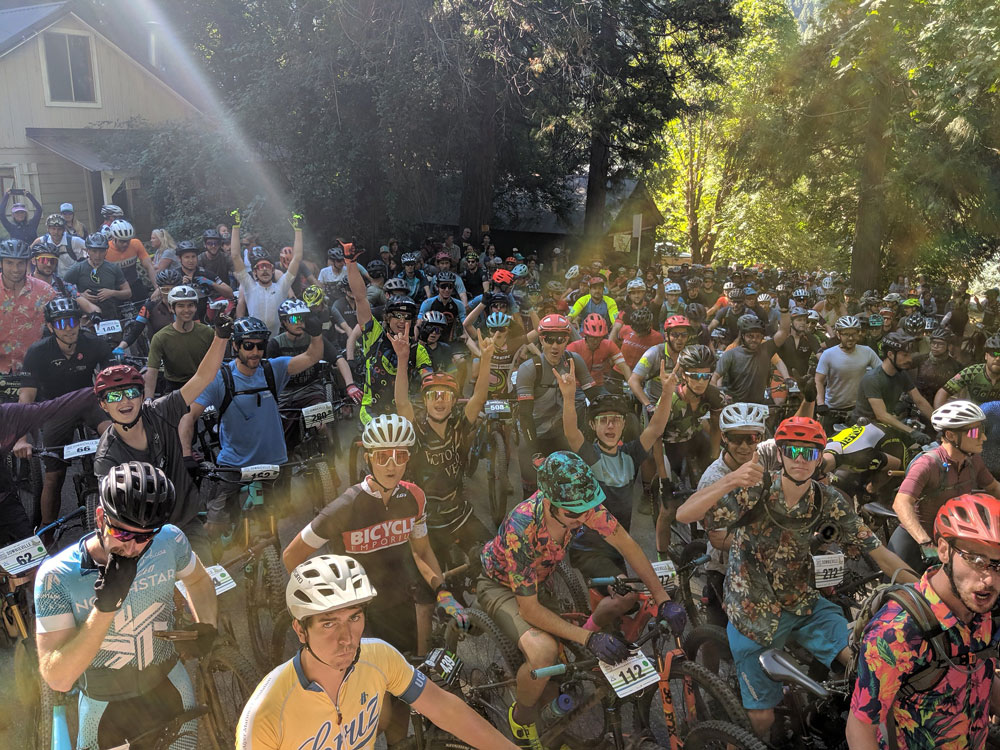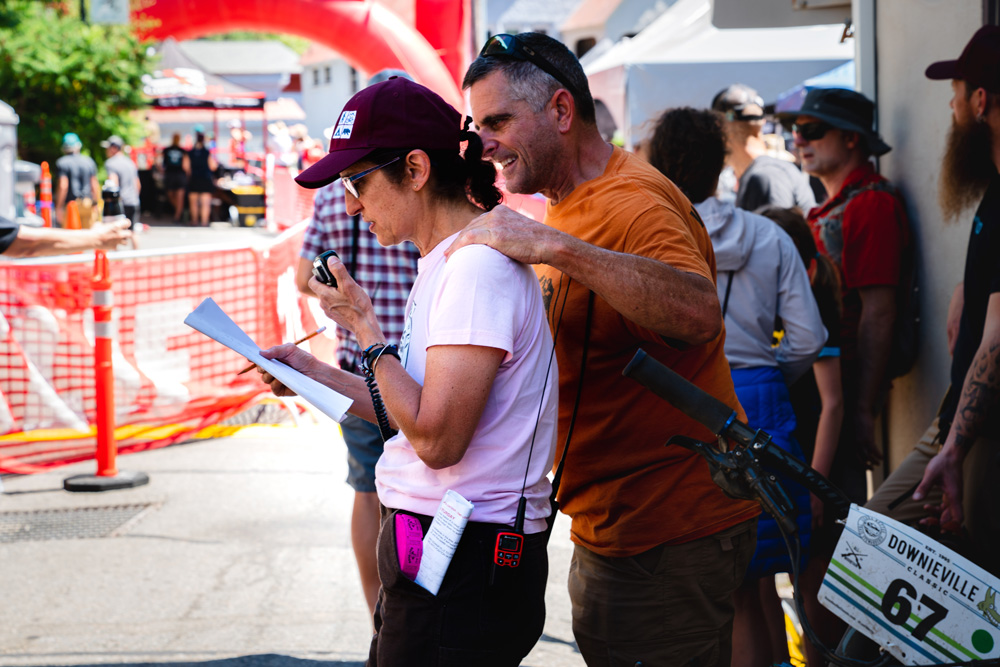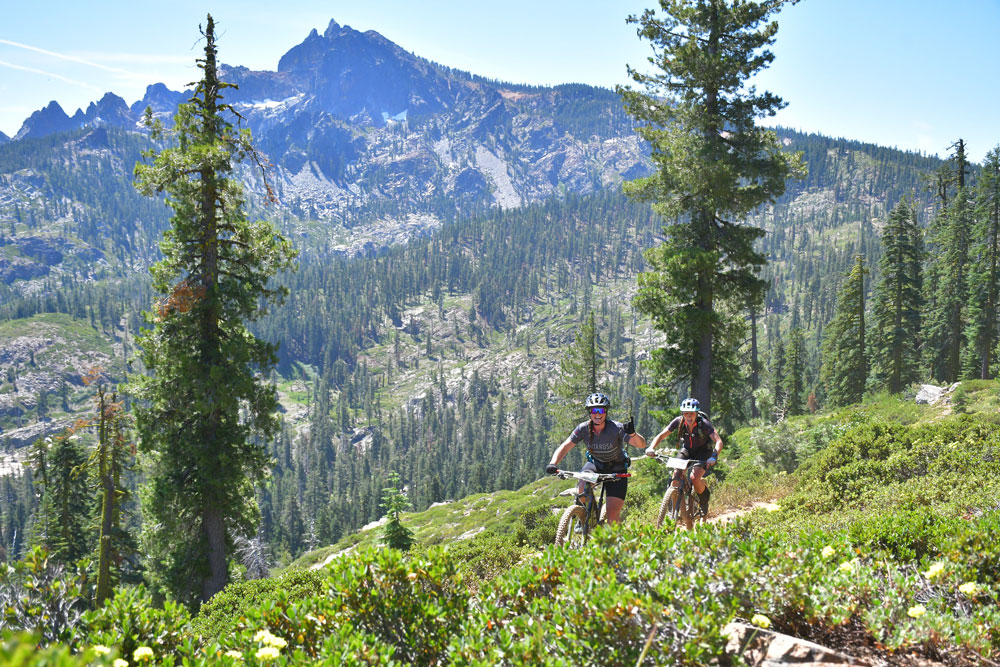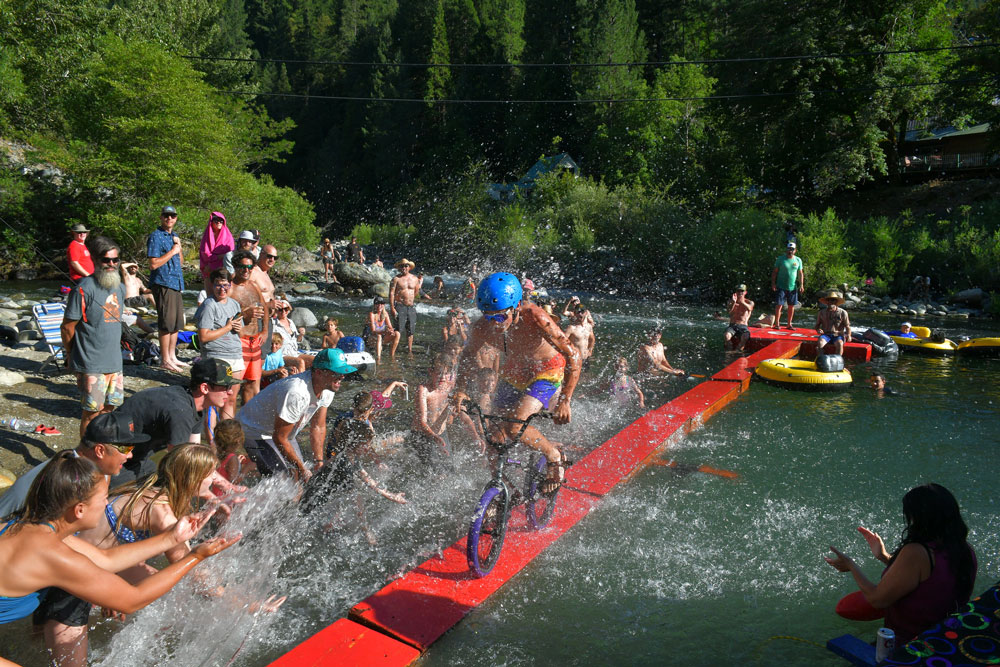The Start
Mountain bikes are everywhere: on car racks, in truck beds and vans, leaning against buildings, and pedaling up and down both lanes of this rural mountain highway. The ones with bibs zip-tied to the handlebars are about to race a 26.5-mile course that climbs 4,500 feet and descends 5,700 feet. It’s the first Saturday in August, and this is the start line of the Downieville Classic Cross Country Race. The mounting energy is palpable.
“Riders, if you have the prerace jitters, only use a public restroom,” says Marty Scheel, the race emcee, over a loudspeaker.
I hear Scheel’s voice boom as I walk up a steep hill to the start line in Sierra City, an outpost on the Pacific Crest Trail that’s about 12 miles up the highway from Downieville. The invasion of mountain bikers had woken up this sleepy small community. Volunteers in neon vests direct line up cars in a dirt lot like sardines in a can. Other volunteers on moto-bikes zip up the course to get to their posts at first aid stations, while more help riders find their start zones. Photographers maneuver into place, angling their shot through the trees. A drone hovers above the start line.

Racers crowd the start line at the 2019 Downieville Classic. (Photo courtesy of Sierra Buttes Trail Stewardship)
Every person has a place to be and a job to do. But the person who is calling all of the shots is not at the start line. She’s back in Downieville, where I would soon find her leaning against her truck’s open tailgate checking in late volunteers.
Debbie Bonovich is the Downieville Classic’s longtime power behind the throne, which describes what she does far better than her official “volunteer coordinator” title. Organized and detail-oriented, her mission is to make the 800-person race, plus the affiliated events that attract thousands, operate safe and smoothly. She commands a volunteer force of 200 people, a role she’s held for over two decades. She knows what’s happening at any given moment, in any given location. She has not one, not two, but three radios stuffed into the pockets of her cargo shorts. One of them is a direct line to Scheel. So even though Bonovich is miles away, I can bet she’s listening as Scheel counts down to the 9:30am start.
“Five, four, three, two …” and the pros pedal madly uphill as the expert group files into the start gate behind them. All 4,500 vert of climbing is stacked in 10 miles at the front of the race, so it won’t take long for leaders to emerge. The rest will fall in line.
The Race
Since its founding in 1995, the Downieville Classic has been, first and foremost, a mountain bike race, with cross-country competitors on Saturday and downhillers on Sunday. It is the original of three race-slash-parties hosted by the Sierra Buttes Trail Stewardship, which has played a big role to revitalize the economy of this rural area in Northern California through trail building and mountain-bike tourism. In addition to the Classic, the Stewardship runs the 1,000-competitor Grinduro in Quincy, California, in September and the 1,500-competitor Lost and Found in Portola, California, in June. Income from these keystone events fuels the organization’s fundraising engine and helped the group build almost 80 miles of new trails and maintain 800 miles of trails that receive an estimated 200,000 tourist visits every year. Even though the Classic is the smallest in terms of competitors, Greg Williams, executive director of the Sierra Buttes Trail Stewardship, says it attracts the biggest crowd and has the most energy.
“I don’t know how many events like this exist, especially today,” Williams says, “where you have a sense of community and people feel like they’re really special. That’s how it’s grown from a couple of riders to, ‘Hey, I’m going to bring my friend.’ ‘Hey, I have kids and I’m going to bring them.’ People race one year and the next year, they volunteer.”
At the Classic, Saturday’s cross-country race is a rugged point-to-point course, mostly on singletrack, that climbs to the Sierra Nevada crest and rushes back down through the forest and the heart of California’s gold country. Sunday follows up with the 350-competitor downhill, intimidating and unrelenting. Both take place on extremely technical courses that will see you soaring off cliffs and hitting top speeds through the steep trees. The Sierra Nevada’s fine, dry dirt is guaranteed to wind up in your teeth. For those who don’t stomp the line through the baby heads and the rock gardens, the trail will beat you up and leave you bloody.
Despite selling out every year, the Classic keeps a firm cap on 800 competitor slots. And yet, the event keeps growing. “What started out as a bunch of dudes hanging out—families are now planning their summer vacations around it,” Williams says. This year, some 3,000 people arrived for a weekend that felt more like a festival than just a race, with beer tents, vendor booths, concerts and parties.
Williams is very much the face of the event. Alongside the Stewardship’s core group of employees and board members, he developed it at every stage, from concept to permits. But if he’s the creator and the brains, Bonovich is the heart. “If Debbie tells you to do something, you do it,” he says, admitting he might just cry from the sweet spot she hits. “You see how many people come to volunteer. I think they’re just honored to work with her. She’s definitely a leader.”

Debbie Bonovich at the Downieville Classic finish line. (Photo credit: Michael McSherry)
While Williams gets to enjoy race day, giving hugs and making everyone feel welcome, Bonovich, 59, is a general in her element. Today, her brown hair is pulled back into a tight ponytail. She wears glasses, and in her pockets, next to her radios, she has also stuffed a handful of pencils and a rolled up sheet of paper outlining each volunteer’s posting. She is wearing running shoes and a pink T-shirt, so she stands out among the many black Downieville Classic tees the other volunteers wear. At 10:30am, her fitness tracker counts 10,552 steps. If anyone has a question or needs instruction, they look for Bonovich. To find her, the other volunteers suggest standing in one place long enough for her to lap you. She’ll be on the move until Monday morning, when she goes back home to Sacramento.
Paul Giffin, the town’s retired pastor and 15-year volunteer at the Classic, has water bottles filled and ready to hand to riders when they cross the finish line.The crew at the timing booth is set up behind computers and clipboards, ready to record times and bib numbers when racers coast under the blow-up arch at the finish. Who has the beer and lunch tickets for the volunteers? Bonovich needs to grab them from the bike shop. The woman running the timing booth shouts after Bonovich as she walks off: “You’re a fluffy unicorn, and I love you!”
A volunteer radios an update from the race course: The top two riders are battling for the lead and they just pedaled past Third Divide, a fast section about two-thirds of the way along the course that is said to make riders feel like a “Jedi in the woods.”
“The first riders are going to be here soon. Like soon, soon,” Bonovich says, mostly to herself. She takes another radio out and passes the update to Scheel, who echoes the announcement over the loudspeaker. Then she hurries to grab the beer and lunch tickets. Multitasking is a daily practice for Bonovich. Her full-time job is supervisor in the student housing and dining department at UC Davis, so managing volunteers comes naturally. She’s also the treasurer for the Sierra Buttes Trail Stewardship, though she’s been involved with the mountain biking scene in Downieville since well before the group was formed. She and her husband, Chuck, started mountain biking here in 1992.

Riders smile for the camera during a climb. (Photo Courtesy: Sierra Buttes Trail Stewardship)
“It wasn’t that she learned how to do it. It’s that she evolved into it,” he says, right after he helps his wife set up a tent to give spectators shade.
Bonovich is old school. For a long time, she managed all of the volunteers and their shifts manually with a computer spreadsheet.
“She knows every person. She knows every detail,” says Jeff Sperry, her co-coordinator. Sperry started volunteering several years ago at the beer tent, but he kept finding more ways to help out. When he realized Bonovich was manually typing everything into the spreadsheet, he told her there was a way to automate that process. She promoted him to co-coordinator.
Bonovich sees bikes locked to the steel barricade near the finish and shakes her head. Still walking, she radios that those bikes need to go, now. Seconds later, Scheel’s voice booms over the loudspeaker, repeating Bonovich’s words with one tweak: He attributes her demand to the Sheriff and California Highway Patrol. Bonovich smiles. She might as well be law enforcement this weekend.
The Finish
Two hours, five minutes, and four seconds after the start, and Stephan Davoust, a 25-year-old from Durango, Colorado, sprints to first place. Geoff Kabush, 42, from Truckee, California, is 14 seconds behind him.
Bonovich speed-walks toward the finish line, arms full of sparkling water for the volunteers. Beer and lunch tickets are stuffed into her shorts. Both racers are hunched over their bikes in a few feet of shade behind a building off Main Street, guzzling water and breathing heavily. Their faces are spackled with mud. Their legs are a few shades darker than the rest of their bodies.
Bonovich pauses to give me a chance to interview them. I’ve shadowed her all morning, and no matter how fast I walked, I was always a few steps behind her. I am so absorbed with keeping pace, that I am completely caught off guard by the opportunity to interview the winners. Giffin, the retired pastor, confirmed my instincts: Bonovich is at the heart of any story about the Downieville Classic.
“It wouldn’t work the way it does without her,” he says. “She’s always been very gracious toward all the volunteers and the riders. At the same time, she holds a firm line, which is necessary.”

Riders and spectators party after the race. (Photo courtesy of Sierra Buttes Trail Stewardship.)
Fifteen minutes later and the end zone is now packed with dirt-covered riders. Bonovich holds a bike for Cody Kaiser, 27, who rode into 10th place and is now sitting on his butt in the shade, feet sprawled, catching his breath, squirting water on a towel to hang around his neck.
“I knew this kid when he was 8 years old and racing,” Bonovich says.
Then she’s talking firmly and loudly, waving her arms to get the racers to move out of the way and make room for others. A moment later, she’s congratulating 42-year-old Katerina Nash, who just placed first among women.
An injury gets called in. She holds the radio to her ear, monitoring the response. She ducks into the first-aid room to coordinate an ambulance pickup with the Downieville Fire Department. When the sister of the injured biker wanders up through the crowd to ask for an update, Bonovich tells her he’s OK. Her voice is soft, patient and compassionate: She can change her tone in an instant to accomplish exactly what she wants done, even if it’s to comfort a worried sibling.
Hours later, the sun is beating down with mid-afternoon intensity and Bonovich is still moving. The fastest racers have rinsed the dirt off themselves and their bikes, and the line for the spaghetti-and-salad lunch stretches all the way down Main Street. Chuck, Debbie’s husband, shows up with a bottle of water for her. He knows she’s not going to eat anything until the race is over.
“It’s such a sense of accomplishment to see all these riders come through with their hearts out,” Bonovich says, but it’s not only the competitors that motivates her. “We’re raising money for the trails. It’s all for trail maintenance and economical development in the Lost Sierra.”
Near the end of the pack, a woman stumbles off her bike and into the arms of her boyfriend, who proceeds to get down on his knee to propose. Bonovich is one of the handful of people to see it, before the emcee announces the good news to the rest of the festival over the loudspeaker.
Well after the awards, when the sun has a late-afternoon glow, I find Bonovich back at the finish line. The arch and the water station are gone, and the road has reopened. She’s about to walk yet another lap through town, but someone intercepts her to offer her a ride in a dune buggy. Bonovich accepts, sitting down for a few moments before she is on her feet again, off to the big air bike jump. And after that, the log pull, and after that, there’s the party—though she’ll skip that one to get some sleep instead. She needs to wake up early to do it all over again for the downhill tomorrow.
